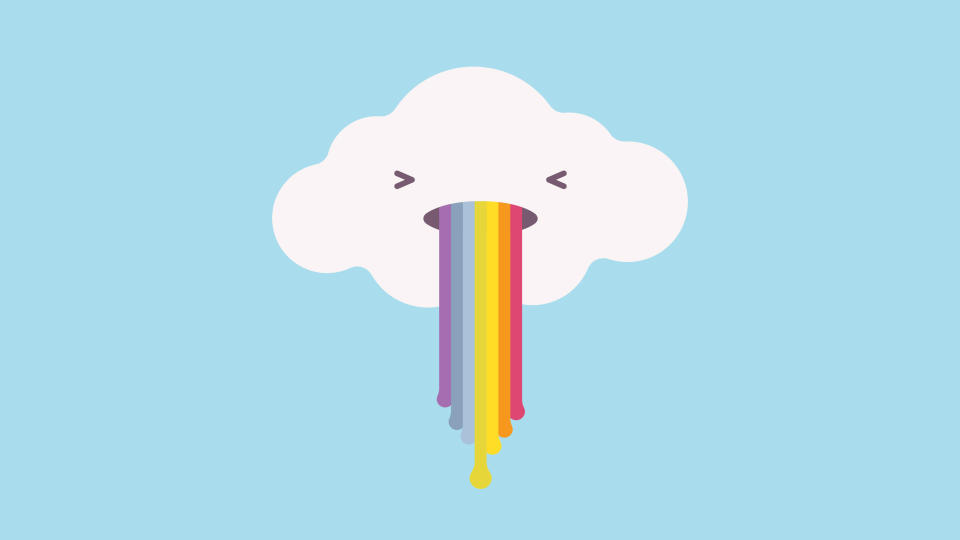How to deal with the fear of puking

Challenging the boring old stereotype that all Irish like a drink, Eamonn Holmes revealed this week that he doesn’t drink alcohol on account of his very real fear of throwing up.
“I can't honestly say I've ever been drunk in my life,” he told White Wine Question Time podcast host Kate Thornton. “I've been tiddly a couple of times, but I've never been drunk or out of control.
“I have a fear of vomiting, which is called emetophobia. I would do anything. I would have a sore tummy for years. I don't care what end it comes out, as long as it doesn't come out of my mouth!”
It might sound odd, but Eamonn’s aversion is a recognised phobia – and one that up to 3% of men and 7% of women suffer from, according to Anxiety UK.

What is a phobia?
The NHS defines a phobia as “an overwhelming and debilitating fear of an object, place, situation, feeling or animal”.
“Lots of us want to avoid things or situations that we’re scared of, like spiders or public speaking, for example,” explains Stephen Buckley, Head of Information at Mind.
“We might find ways to avoid these situations or manage our feelings if we can’t. But if you have a phobia that can be a lot harder to do. There isn’t one cause of phobias but there are several factors that might contribute to developing one.”
This can include genetics, a traumatic experience or a learnt response to situations that was picked up early in life.

That sick feeling
While the fear of vomiting is often triggered by a negative experience of being sick, for some sufferers, including Eamonn, it’s actually more about being out of control.
“One day I was on Radio 2, and I was interviewing a psychiatrist and we spoke about me not drinking,” Eamonn told Kate. “He basically said: ‘That's a control thing. You do not want to be out of control and when you're throwing up, you're out of control’.”
Eamonn remembers seeing his schoolmates getting drunk and being sick. “I thought, ‘I see nothing attractive about this’,” he said. “They're lying in the corner throwing up, that's what they're doing.”
Can emetophobia be cured?
If left unchecked, emetophobia can actually turn into a much more complex phobia such as agoraphobia.
As Stephen from Mind explains: “A phobia might mean that you spend a lot of time worrying about a situation or object, or go to extreme lengths to avoid it. This can have a big impact on your life, and lead to you turning down opportunities, like jobs, in which you think you’ll have to confront the things you’re worried about.”

Some sufferers of emetophobia fear being sick so much that they cannot travel, socialise or even leave the house. Some patients also develop eating disorders as they become so fearful of eating anything that might cause them to vomit.
There are, however, ways to deal with the phobia.
Cognitive Behavioural Therapy (CBT) is usually the first defence against simple phobias. It can help confront fears and replace negative thoughts about vomiting with more positive thoughts. Hypnotherapy has also been found to help in some occasions, especially when it comes to unearthing the root cause of the phobia.
My love for her was stronger than my fear of vomit, and it’s definitely helped me on the road to recovery.
Anna [surname withheld], 54 and a child protection officer, has suffered with emetophobia for as long as she can remember. She was hypnotised in an attempt to find out what caused her fear and was surprised to find it stemmed from something that happened to her when she was very young.
“During my session, I was taken back to the first time my fear really hit,” she explains. “It stems from an occasion when I was around 3 or 4 and I was violently ill with a stomach bug. I threw up all over my mum and her new dress. She was so cross about her dress being ruined and I believe this is where my fear of vomiting came from.”
Anna has used hypnotherapy alongside CBT to help her come to terms with her phobia.
“I wouldn’t say I’m cured, but I’m a lot less scared of being ill,” she says.

Exposure therapy, which involves gradually exposing a person to their fear in a controlled environment, is also another option. For some, it’s a step too far, but for Tim it’s really worked.
“I’ve suffered from a phobia of being sick since I was 7 and threw up all over myself in the classroom,” explains Tim [surname withheld] now 39. “I was so embarrassed that I was determined never to be sick again. I didn’t drink alcohol for years and I was always nervous about being around sick people.”
However, a change in Tim’s circumstances has meant his phobia is a dim and distant memory.
“Things changed for me when my wife and I had our first child, Ella, six years ago,” recalls Tim, an IT consultant. “Ella picked up a sickness bug from nursery while my wife was away with work and I just had to deal with it. My love for her was stronger than my fear of vomit, and it’s definitely helped me on the road to recovery.”
Some people also find anti-depressants helpful. While SSRIs – selective serotonin reuptake inhibitors – are usually prescribed for depression, they can also be prescribed in cases of severe anxiety and phobias. They work by upping the levels of serotonin – the ‘happy’ hormone – increasing the feeling of wellbeing.
“If your phobia is interfering with your everyday life or keeps you from doing things you would otherwise enjoy, it is advisable to seek help,” advises Stephen. “Your GP should be able to talk to you about the options, which could include talking treatments or medication.”
You can also get more information about phobias and how to get further help from Anxiety UK or Mind.
Hear more of Eamonn Holmes chat about this life, relationships and more on the latest episode of White Wine Question Time.

 Yahoo Lifestyle
Yahoo Lifestyle 